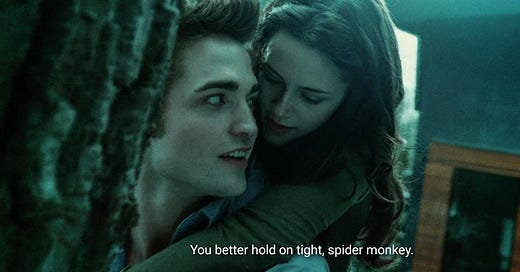Reboot, Redo, Retitle: Hollywood's Trip to the Recycling Plant
As the Animaniacs sang in their own 2020 reboot, "For a guaranteed ratings smash, dig it up out of the trash, c'mon, just reboot it."
TV reboots for “Twilight” and “Harry Potter” have both been announced as in the works, and honestly, I’m just tired. Is the content well really so dry that we need to reinvent movies that are barely over 10 years old? Moving at Renesmee aging speeds here!! What really boggles me with these recent announcements is the choice of IP. Both these franchises are extremely successful as-is and have bounced between streaming services because people are willing to subscribe purely just to rewatch them. It’s me, I’m people. The “Twilight” baseball scene alone…
The purpose of remakes is clear: to capitalize on an existing audience and get the studio a solid return on investment from the fans who will watch purely for nostalgia’s sake. And yes, in the ultra-competitive world of filmed content, a big-budget remake is likely to do alright—even if it sucks. Yet Hollywood seems particularly reinvigorated in the past few years to answer the question of how to measure up to greater competition with an all too simple answer: just redo what worked in the past.
In actuality, redoing something popular hasn’t meant gaining success again. Maybe people will see it, maybe it’ll make a fair amount of money at the box office, but as is the case of many reboots in the past few years, they mainly lead to online clownery and complaints about how it doesn’t measure up to the original. And honestly, that might be the goal. Get enough people talking about something and it’ll get watched, even if it’s just a hate watch. I’ve indulged in many a hate watch myself, (“Emily in Paris,” you know what you’ve done) but it’s kind of exhausting. Plus, there’s way too many good TV shows and movies out there to waste time on subpar things just because they have name recognition.
Younger generations are just starting to creep into the age range of demographics that reboots are most often intended to pander to. As an elder Gen Z, (swivel cell phone and family computer hive rise!!) I am very much a part of this eternally-online group. Problem is, I!! don’t!! want!! reboots!! I’m more than happy to rewatch the original version ad nauseam without ever wondering, hmm, what would this be like set in present day with a less charismatic cast and a slightly watered down plot?
Living in an era of reboots is especially jarring when some of the best films and TV ever made are simultaneously being released. From “Succession” to the Barbie movie, (lmao imagine the crossover episode) inventive and impeccably made film media is very much alive and well, and, as my Twitter feed can attest, captures the public’s attention. It’s just been forced to share some screen time with its twerp little brother, the reboot.
Not all reboots are bad, though saying that I can’t really think of a recent one I’ve particularly liked other than “Animaniacs,” which was outwardly self-deprecating of its own reboot-ness. Admitting to the cash-grab ridiculousness of it all or actually trying to take something in a new direction makes me less resistant to a rehashing. While not actually a reboot itself, the Hulu series “Reboot” did both in spades, poking fun not only at the idea of reboots themselves, but looking closer at the people and creative decisions behind them. Ironically, the series got the boot and was cancelled after a single season, (execs said hmmm I’m in this photo and I don’t like it) but the focus stands.
All in all, reboots are kind of a lazy choice in the grand scheme of storytelling. It’s not asking much out of the creators or the viewer. Plus, most of the magic that makes something a good candidate for rebooting is the exact same reason no fan wants a reboot of it. This is cinema! You can do way cooler things!! New ideas are out there! The world’s your oyster!! Okay okay, I’ll get off my cheesy inspirational poster soapbox now.
Until next time! (when I eventually reboot this newsletter)




